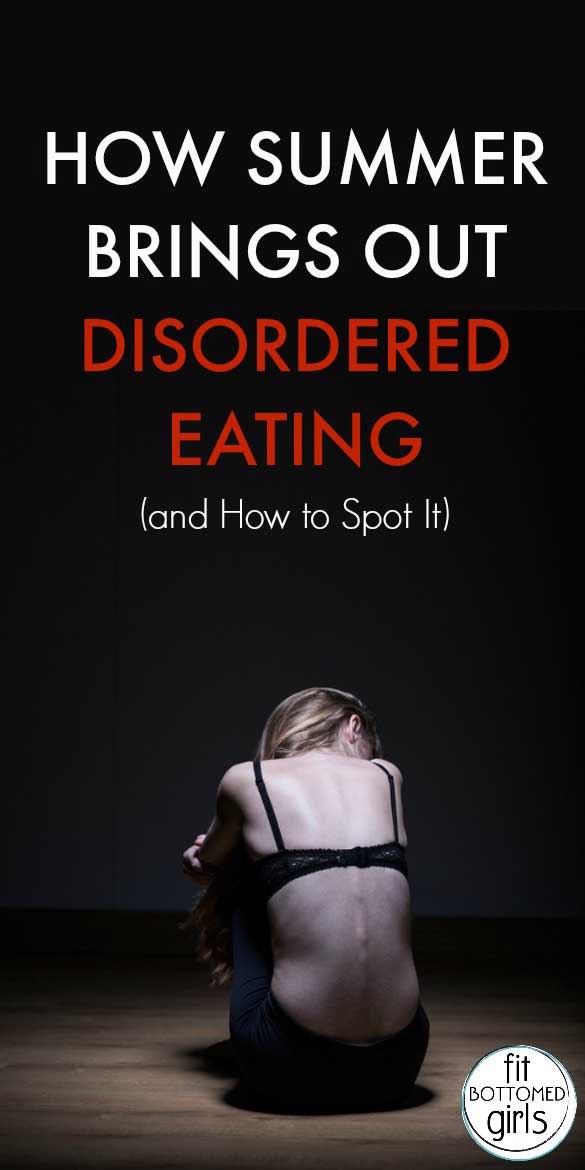How Summer Brings Out Disordered Eating (and How to Spot It)
 We grow up looking forward to summer every year. The freedom! The sunshine! The cookouts! The vacations!
We grow up looking forward to summer every year. The freedom! The sunshine! The cookouts! The vacations!
But if you — or someone you care about — struggle with disordered eating (and according to the National Eating Disorders Association, 20 million women and 10 million men will suffer from a clinically significant eating disorder in their lifetime), summer can be a pretty rough time. Some of those same things we’re supposed to love about summer (trips to the beach! picnics!) can be just the things that trigger disordered eating. We talked to P.D. Alleva, MSW, the founding owner of Lifescape Solutions and Evolve Mental Health, a substance abuse and mental health treatment program in Delray Beach, Fla., to see what exactly we should know about eating disorders and summer.
FBG: What are some summer-specific eating disorder triggers we should know about?
P.D. Alleva: Warmer weather = less clothing = increase in body image issues/insecurities surfacing. Both women and men who suffer from eating disorders/body image issues tend to live comparatively, looking for those who are “thinner,” “stronger,” “more muscular” and “sexier” than they are. Rather than celebrating their own bodies’ abilities and beauty, they seek out those bodies that they can say are “better” than theirs to reinforce their negative self beliefs.
Summertime also brings more advertisements about dieting, working out, gym memberships, deals on the newest diet fads — all capitalizing on the societal expectation that with summer comes the pressure to be “good,” eat well and “look better.” For those with ED/Body Image issues, this only reinforces the belief that looking better is being better.
The idea of starting to work out or eat clean in summer or prior to summer is always acceptable and, more often than not, eating disorders such as exercise bulimia or orthorexia can be hidden quite well. [But] any noticeable changes in attitude towards food/body/self are a red flag.
What signs should one watch for in a friend if we suspect disordered eating?
PDA: Watch for the following:
- Increased loss or gain in weight
- Obsession of appearance
- Wearing clothes to hide body changes
- Constant talking about losing weight, how much he/she weighs, new focus on body in a negative way
- Not engaging in social activities involving food — going out to eat, going to parties, claiming not to be hungry or to have eaten earlier
- Becoming socially withdrawn or isolated/change in mood
What suggestions do you offer for dealing with the specific challenges that the summer months present, either for oneself or for a friend battling an eating disorder?
PDA: Summer months, or really any time, you can begin by expressing concern directly to the individual. If concerns continue, then reach out to family of the person you are worried about or perhaps your own family. Get others involved and reach out to a professional. No issue is too small — the worst thing that could happen is that you could be mistaken.
Please share three ways in which true change occurs.
- Recognition of the true self which is not the personality you are projecting
- Only the person can make the choice to change
- Be willing to live a spiritual life
P.D. Alleva, MSW, is the founding owner of Lifescape Solutions and Evolve Mental Health, a substance abuse and mental health treatment program in Delray Beach, Fla., based on a new model of healing and psychotherapy called Spiritual Growth Therapy. He has also created his own model of hypnotherapy training, and has created highly successful models for working with self-harm, trauma and PTSD, and continues to develop new adaptations of the models he has created. Learn more about his new book Let Your Soul Evolve: Spiritual Growth for the New Millennium, at www.spiritualgrowththerapy.com and connect on Facebook, Twitter and LinkedIn.
Do you find yourself thinking differently about your body, food and fitness in different seasons? —Kristen
